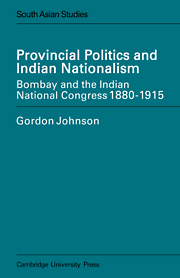Book contents
- Frontmatter
- Contents
- List of plates
- Acknowledgements
- Dedication
- Abbreviations
- Introduction
- 1 The Indian National Congress
- 2 The politics of western India in the later nineteenth century
- 3 Tilak, Gokhale and the Indian National Congress, 1895 to 1906
- 4 Tilak, Gokhale and the Indian National Congress, 1907 to 1915
- A perspective
- Note on sources
- Index
- Plate section
1 - The Indian National Congress
Published online by Cambridge University Press: 24 November 2009
- Frontmatter
- Contents
- List of plates
- Acknowledgements
- Dedication
- Abbreviations
- Introduction
- 1 The Indian National Congress
- 2 The politics of western India in the later nineteenth century
- 3 Tilak, Gokhale and the Indian National Congress, 1895 to 1906
- 4 Tilak, Gokhale and the Indian National Congress, 1907 to 1915
- A perspective
- Note on sources
- Index
- Plate section
Summary
On 28 December 1885 a gathering of ‘certain well-known men’ assembled in Bombay with the object of enabling all ‘the most earnest labourers in the cause of national progress to become personally known to each other’. Close on one hundred gentlemen attended the meeting, but the number of active participants was seventy-two. At this assembly, the Indian National Congress, the first all-India political association, came into being. A second meeting was held in Calcutta in 1886, and a third, held in Madras, followed in 1887. Thereafter meetings of the Congress became regular annual events. The organisers of the third session claimed with reason that ‘What in 1885 was little more than an experiment, in 1887 bore every appearance of becoming a permanent National Institution.’
The founding of the Congress was one of the most important political events in India in the later nineteenth century. The Congress soon became recognised as the main vehicle of nationalism in India, and it was to prove particularly good at adapting itself to political change in the twentieth century. As more and more Indians began to participate in the struggles for political power, the Congress continually reshaped itself and held on to its central dominating role. When India became independent in 1947 the Congress naturally assumed office, and with the coming of the mass franchise it showed once again its capacity for meeting new challenges.
- Type
- Chapter
- Information
- Provincial Politics and Indian NationalismBombay and the Indian National Congress 1880-1915, pp. 5 - 52Publisher: Cambridge University PressPrint publication year: 1974



